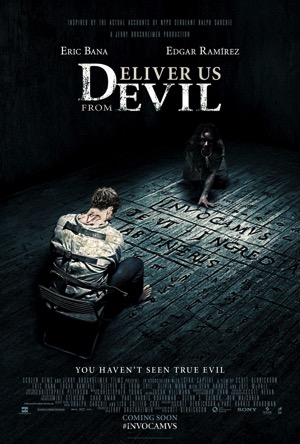Scott Derrickson is a thoughtful Christian filmmaker. This fascinating and frank interview (abbreviated in print – the video version is very much worth the time) challenges us to consider how Christians can make art that is both true and good. And though Derrickson has ventured into sci-fi and will tackle the (Marvel) comic book world with the soon to be released Doctor Strange, his preferred canvas is horror. Hence, this is one Christian director whose movies are not being screened for churches.
 My wife and I just watched Derrickson’s 2014 release Deliver Us from Evil. It is a police drama with, shall we say, a twist. Or two. Sargent Ralph Sarchie (Eric Bana) is a lapsed Catholic serving the Bronx. A string of inexplicably odd cases lead him into a relationship with a tough and hard drinking Jesuit priest, Father Mendoza (Edgar Ramirez), who insists sainthood is not about being a moral exemplar but being a life giver. And that is what he proceeds to do. Without apology the priest speaks an honest faith into the life of the struggling cop, and it shakes him deeply.
My wife and I just watched Derrickson’s 2014 release Deliver Us from Evil. It is a police drama with, shall we say, a twist. Or two. Sargent Ralph Sarchie (Eric Bana) is a lapsed Catholic serving the Bronx. A string of inexplicably odd cases lead him into a relationship with a tough and hard drinking Jesuit priest, Father Mendoza (Edgar Ramirez), who insists sainthood is not about being a moral exemplar but being a life giver. And that is what he proceeds to do. Without apology the priest speaks an honest faith into the life of the struggling cop, and it shakes him deeply.
We have been lead to believe that good theology and good apologetics are not to be found in a major Hollywood release. That is far less true than we might imagine. They are certainly found here. At one point, Sargent Sarchie is explaining why he has no room for God in his life. He says,
You see, Father, as we speak, every day, out there, someone’s getting hurt, ripped off, murdered, raped. Where’s God when all that’s happening? Hmm?
Father Mendoza is nonplussed by this. He responds:
In the hearts of people like you, who put a stop to it. I mean, we can talk all night about the problem of evil, but what about the problem of good? I mean, if there’s no God, if the world is just “survival of the fittest,” then why are all the men in this room willing to lay down their lives for total strangers? Hmm?
As an apologetic approach that isn’t ground breaking, but Mendoza speaks as one who believes, but does so without being pushy or in any way condemning. A saint is a life giver.
The story is well told and engaging. The dialog is smart and the images well drawn. There is a good pace that keeps the viewer engaged. And so the film’s 28% Rotten Tomatoes rating is a surprise, but not inexplicable. Some reviewers fault him for his dependence on horror conventions. I can’t evaluate that. But I suspect that the fault most find and don’t speak is that Derrickson takes the reality of evil seriously. The demonic for him is not merely a convention of the genre; it is the reason the genre exists. Horror is the place to confront and expose and consider a reality that we in our churches prefer to dismiss and ignore and disbelieve. That he takes it seriously is something that some critics can’t comprehend.
I find his serious take a challenge. Unlike Sargent Sarchie, I don’t spend my days staring into the worst of human behavior, or what Father Mendoza calls ‘secondary’ evil. I need to be reminded of the reality of what he calls ‘primary’ evil. Therein lies the real enemy. Our senses only take in part of what is real. Our battle in this world is not against flesh and blood, and it is good to be reminded of that.
The NY Times movie reviews are always worth reading if only for their ratings info at the end. For this movie, we read
Deliver Us from Evilis rated R (Under 17 requires accompanying parent or adult guardian) because it has gore and cursing and is disturbing as, you might say, hell.
Disturbing as hell, for sure. But encouraging, too, because, in the end, hell does not win.
